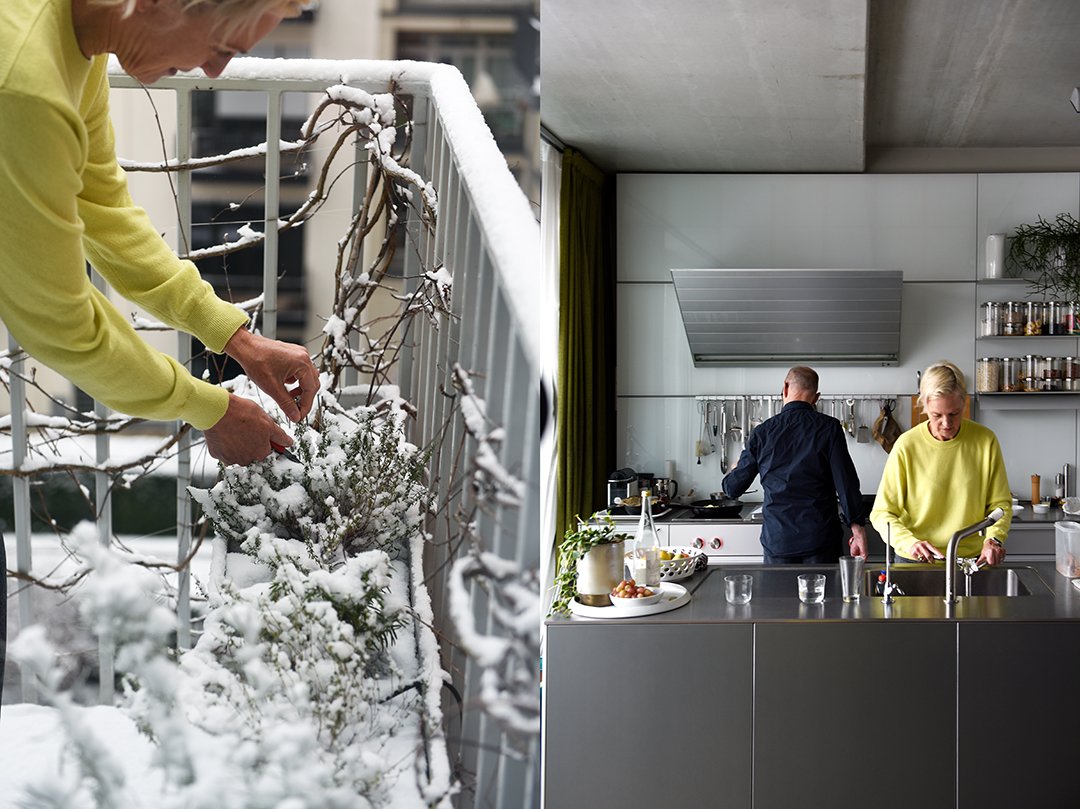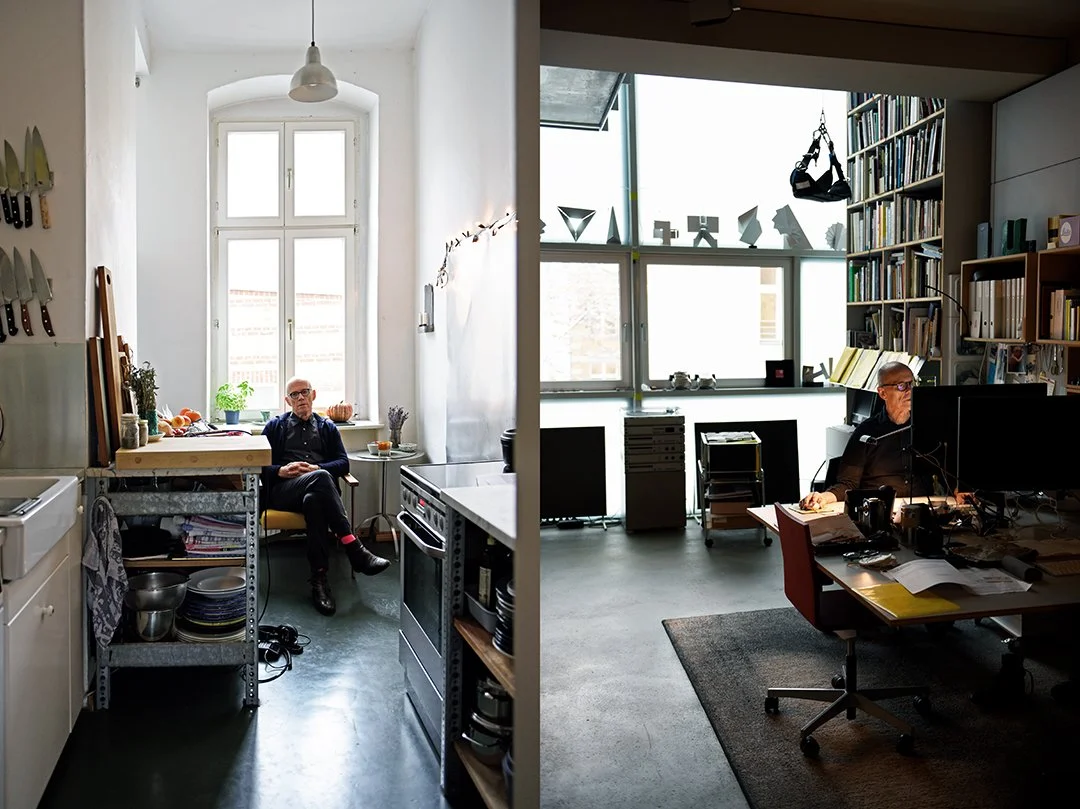Meet In Your Kitchen | Erik Spiekermann's Lemony Mushroom Risotto
This post is part of my Meet in My Kitchen podcast: How did we get to where we are in life & what does food have to do with it
"I’m incredibly chaotic and I’m incredibly precise. When I do work like typesetting and stuff, I’m 100% precise. I do the shittiest detail that nobody would ever know, but I’m also incredibly chaotic in my approach." - Erik Spiekermann
Erik Spiekermann's greatest gift is that he never stopped thinking like a child. He's still driven by the same stubborn persistence, by a tireless curiosity, and the imperturbable will to find out what lies underneath the surface. The acclaimed designer and typographer, responsible for the corporate looks of brands like Audi, Bosch, and Deutsche Bahn, creator of Meta - the Helvetica of the 90s - and the man who decided that the BVG, Berlin's public transportation system, needs to be yellow, is basically still a child, just in the body of a man.
"My curiosity is my biggest feature. I’ve always been curious, so much so that I have been careless. I mean I’ve done things like hitchhike to fucking Norway at 9, which is stupid, it’s the dumbest thing to do if I look back now but I was curious and I was innocent, and innocent and curious are the same. You’re innocent about something so you wanna find out how it works. And I’m still curious and I will try everything because it’s interesting and I think curiosity is one of the greatest human features otherwise we wouldn’t have invented the wheel nor the fire." - Erik Spiekermann
When Erik was nine years old he hitchhiked to Norway on his own. He was part of a Boy Scouts group, his older travel companion didn't show up so he decided to go up north on his own. I asked what his mother said, and Erik's brief answer was "She didn't know, only when I came back weeks later, rather tanned."
As a teenage boy, he was already fascinated by press printing. He got his first printing machine from his father, a mechanic who Erik thinks passed his strong passion for heavy machinery and their mysteries on to him. Whenever he got the chance, he sneaked into a friend's printing firm at night, trying to figure out how all of this works. Setting type and ruining one plate after the other until he internalized the concept - letting any proof of his failed attempts vanish by dawn - but when he finally filled the white pages with his own hands and ideas he was hooked.
Post-war Germany wasn't an easy playing field for a pubescent boy and young man, chances had to be made by yourself and Erik created plenty of them. First in Berlin, then he moved to London in the 60s with his young family, always managing to convince the people around him that he has the ideas that they need.
"We need to make things, we need to touch things with our hands, otherwise we’re gonna become very funny sort of reptiles or robots." - Erik Spiekermann
It only takes a few seconds to understand how Erik always manages to get people's full attention - and their trust. He is very charming but he is also a road roller. For the podcast recording at my place, he ran up the stairs with his racing bicycle on his shoulder (mind he's born 1947), he wasn't out of breath at all but ready to dive into hours of talking about design, life, and food. Erik used to often bake with his mother, never measuring anything, but sensitively adjusting texture, taste, and smell by feeling. Even then he didn't need anyone to tell him what to do, just a mother who taught him to refine his senses and listen to them. He is still very protective of his ideas and visions, fighting for them if need be, summed up in one of his many popular quotes: "Don’t work for assholes. Don’t work with assholes."
After years of designing and teaching, Erik decided to go back to his roots. All his printing equipment burnt in a severe fire in London in the 70s. A painful chapter that he never felt he had closed, a story he still wanted to continue writing, so he founded p98a a few years ago. It's a Berlin based non-profit experimental letterpress workshop stuffed with old equipment dedicated to letters, printing, and papers. Together with a group of designers, he passes his knowledge and skills on to the next generation and enjoys the play of old traditional analogue equipment and new digital technologies. You can order books, or posters and postcards with Erik's quotes and wisdoms, and join workshops with the master himself.
Although Erik would have loved to share his no-recipe-cantuccini recipe with me, I was worried that no one would be in the mood for cookies in January so instead, Erik and his wife, Susanna, shared the recipe for their delicious Lemony Mushroom Risotto with me.
The podcast episode with Erik Spiekermann is in English. You can listen to the Meet in My Kitchen podcast on all common podcast platforms; there are English and German episodes. You can find all the blog posts about these podcast episodes including my guests’ recipes here on the blog under Meet in Your Kitchen.
Listen to the podcast episode with Erik on:
Spotify / Apple / Deezer / Google / Amazon / Podimo
On Instagram you can follow the podcast @meetinmykitchenpodcast!
Mushroom Risotto with Lemon and Thyme
by Susanna and Erik
Serves 4 to 6
For the risotto
Fine sea salt
Olive oil
1 medium onion, finely chopped
420g / 2 cups Carnaroli rice, or Arborio rice
240ml / 1 cup dry white wine
70g / 5 tablespoons unsalted butter
60g / 2 ounces Parmesan, finely grated, plus 30g / 1 ounce for serving
4 tablespoons freshly squeezed lemon juice, plus more to taste
For the mushrooms
450g / 1 pound cremini or white mushrooms, trimmed, torn into bite-size pieces
Freshly ground black pepper
30g / 2 tablespoons unsalted butter
8 medium sprigs fresh thyme
3 small garlic cloves, crushed (optional, Susanna loves it, Erik doesn't)
For the risotto, bring 2.5 liters / 10 1/2 cups of water and 1 tablespoon of salt to a boil in a medium saucepan then remove the pan from the heat, cover, and keep warm.
In a large pan, heat a generous splash of olive oil over medium heat. Add the onion and a pinch of salt and cook, stirring constantly, for about 10 minutes or until golden and soft. Add the rice and cook, stirring, for 5 minutes. Add the wine and let it simmer for a few minutes then add a ladle of the hot salted water, the rice should be covered. Let it simmer very gently and, as soon as the liquid is almost fully absorbed, add more of the salted water. Keep adding a little water at a time, stirring gently once in a while. When the rice is al dente and the liquid is more or less absorbed, you might not need all the salted water, take the pan off the heat, and stir in the butter and Parmesan. Add more of the salted water if the texture isn't creamy (not soupy!) and season to taste with additional salt if necessary. Gently stir in the lemon juice, adding more juice to taste, then cover the pan and set aside.
For the mushrooms, heat a generous splash of olive oil over medium-high heat, briefly cook the mushrooms, stirring occasionally, for 2-3 minutes or until browned and still firm (not mushy!). Season to taste with salt and pepper, add the butter, 6 sprigs of thyme (keeping 2 sprigs for serving), and the garlic then reduce the heat to low and cook for a few minutes until the mushrooms are al dente but not soft.
Divide the risotto and mushrooms among bowls, sprinkle with a little Parmesan, some ground pepper, and the leaves of the remaining 2 thyme sprigs, and enjoy immediately.
















